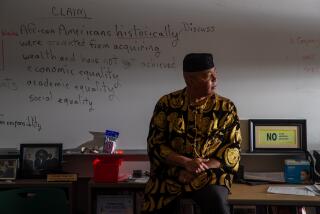Is African American Studies Obsolete? : Education: The discipline must incorporate science and technology to prepare students to compete in the 21st Century.
- Share via
While teaching a course in African American studies, I had a student who was a math major. She was taking calculus and physics and feeling a little overwhelmed, as most students do at some point, said, “Dr. Kwaku, I’m tired of math. It’s so hard. I’m going to change my major to African American studies.” Needless to say, I had a long talk with her about the importance of staying in math, for all the right reasons. Somehow, I felt my words were going in one ear and out the other until I saw her the following semester.
One day while walking across campus, she approached me and said, “Dr. Kwaku, I was thinking of changing my major, but after taking your class and finding out that my African ancestors created mathematics and used it to build the pyramids, I am going to stick with it until I finish.”
Every semester, while teaching African American courses, I get complaints from students who take a science survey course that they never hear about African and African American scientists and their achievements, but learn all about European and EuroAmerican scientists. When they ask the instructor about this, they say he tells them “that if we want to learn anything about those people in science, we can do something for extra credit.”
When I cover the topic of African and African American scientists, inventors, creations and so forth, it is as if a whole new world of information has been dropped on these students. It is amazing that they had to wait for college to learn it.
The problem is not that we just hear about a select few African and African American scientists; it is also time for African American studies to take a giant step into science and technology. It is of utmost importance to study African American history, literature and music, which primarily deal with the past and contribute heavily to a balance of acquired knowledge and consciousness. But it is now time to also deal with the future. If we do not step into the hard sciences and mathematics, building a nation within a nation, some enterprising filmmaker will be making a black “Jurassic Park,” featuring those who can’t do anything but develop another “Wild Kingdom.”
It is understood that struggle plays a role in this process. There are those who fought hard to get positions and programs in African American studies and were the innovators for all so-called ethnic-studies programs. It is also understood that there are those who develop little fiefdoms to protect their positions and are afraid to venture outside of their body of knowledge. The issue is not to eliminate anything or anyone, but to add another dimension that will allow a thorough survey of the scientific achievements of the African and African American world: teaching courses that clearly illustrate how to motivate and stimulate young children into math and science; developing incentives and prizes for scientific achievement in the community that will help to eliminate some of the negative elements; using the high-tech public-relations tools to elevate scientists as equals to movie stars, athletes and rap stars and, most of all, doubling and tripling math and science majors.
African American studies must be the catalyst for bringing about this change. Students will be taking SATs and GREs and filling out employment applications on computers. No African American student should be allowed to graduate without some level of computer competency.
No one should wait for society, the government, academia or anything else to emphasize the future. If the leaders in African American studies are not willing to make the next move to ensure the survival of the community, the preparedness of its growing work force and the strong emphasis on the tools needed to guarantee a future, African American studies won’t be the only thing that becomes obsolete.






